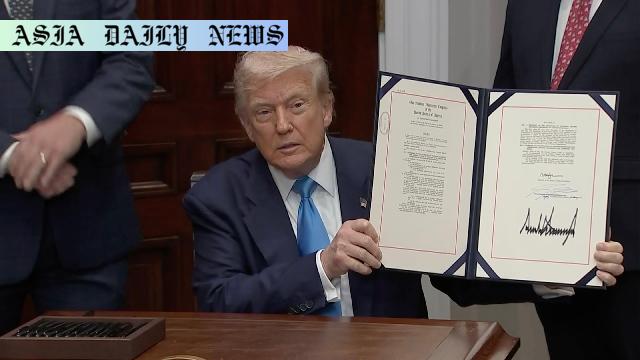Tariffs – Trump imposes a 50% tariff on Brazilian imports, citing political persecution of Bolsonaro as the driving force.
- US President Trump signed an order imposing 50% tariffs on Brazilian imports.
- The decision is tied to the political persecution of ex-President Bolsonaro.
- Some key Brazilian exports, like orange juice and energy, are exempted.

Introduction: The Controversial Tariff Decision
In a move that has captured international attention, US President Donald Trump has implemented an executive order to raise tariffs on imports from Brazil to a staggering 50%. Initially set at 10%, the additional 40% hike signals a sharp deterioration in trade relations between the two countries. Trump justified the tariff increase as a reaction to the “political persecution” faced by his ally, former Brazilian President Jair Bolsonaro. The move has sparked heated discussions on the implications for global trade, US-Brazil relations, and the broader geopolitical landscape.
Rationale Behind the Tariffs
President Trump cited the legal troubles of Bolsonaro, who has been charged with attempting to overturn the results of Brazil’s 2022 presidential election, as a primary reason for this aggressive tariff policy. Claiming to stand against what he perceives as the unfair treatment of Bolsonaro, Trump’s decision to raise tariffs reflects a blend of political positioning and economic strategy. Critics argue that using trade policy as a means of international political pressure sets a concerning precedent, while supporters hail it as a bold stand for allyship and ideological commitment.
Exclusions and Their Implications
Interestingly, not all Brazilian exports are subject to the new tariffs. Exceptions include key commodities such as orange juice, energy resources, and aircraft—sectors that represent significant economic exchanges between the two nations. These exemptions highlight an attempt, albeit limited, to mitigate the economic fallout of the decision. However, analysts caution that even with these exclusions, the overall impact on trade could disrupt key industries and potentially widen the US’s existing trade surplus with Brazil.
Brazil’s Response and Economic Repercussions
The Brazilian government, led by President Luiz Inacio Lula da Silva, has condemned the move, labeling it as an attack on Brazil’s sovereignty and a strain on historical ties. Lula’s administration argues that the tariff hike undermines cooperative efforts between the two nations and sets a troubling tone for bilateral relations. Economists warn that the heightened tariffs could lead to inflated prices for Brazilian goods in the US, reduced export revenues for Brazil, and strained diplomatic relations moving forward.
Broader Implications for US-Brazil Relations
Beyond immediate economic consequences, the tariff decision underscores deeper political and ideological rifts. While the United States and Brazil have long maintained a complex but strategically significant relationship, this development risks creating lasting divides. Observers argue that the move could embolden other nations to employ economic measures for political leverage, further destabilizing already fragile international trade systems.
Conclusion: On the Brink of a Trade Shift
President Trump’s decision to impose 50% tariffs on Brazilian imports represents a significant turning point in US-Brazil relations and global trade dynamics. As both countries navigate the fallout, the broader implications of using trade policy as a political tool remain uncertain. This contentious decision raises questions about the future of international diplomacy and economic cooperation in an increasingly polarized world.



Commentary
Introduction: A Bold but Controversial Move
President Donald Trump’s decision to impose a 50% tariff on Brazilian imports has undoubtedly stirred global debates. On one hand, the move reflects a stark shift in how trade policy can be wielded as a political tool. On the other hand, it highlights the risks and repercussions of blending politics with economics. With the justification rooted in support for former President Jair Bolsonaro, critics are raising valid concerns about the consequences of such a decision on diplomatic relations and global trade norms.
The Burden on Brazil and Global Trade Dynamics
The implications of this tariff decision for Brazil are significant. The increased economic strain on Brazilian exporters could lead to a ripple effect across various industries. For a country already grappling with political and economic challenges, this additional hurdle adds to its woes. Additionally, the precedent set by using tariffs as a political leverage tool could have far-reaching consequences. Other nations may follow suit, leading to instability and unpredictability in global trade policies—impacting markets and economies worldwide.
The US Perspective: Gains or Losses?
From the US perspective, the decision could yield mixed outcomes. While Trump’s administration might view this as a symbolic gesture of allegiance towards allies like Bolsonaro, the domestic economic benefits remain uncertain. Exempting key Brazilian exports such as orange juice and energy underscores that even this bold move comes with calculated hesitations. Yet, the potential for retaliatory trade measures from Brazil or other countries cannot be ignored, which may eventually impact American industries as well.
Moving Forward
This chapter in US-Brazil relations underscores the delicate interplay between international politics and economic policies. As global markets grow increasingly interconnected, trade decisions driven by political motives risk creating cascading effects. Both nations now face the challenge of navigating this newly strained relationship, with much at stake for their economies and diplomatic ties. The outcome of this policy shift will likely serve as a critical case study for the future of international trade and political strategy.